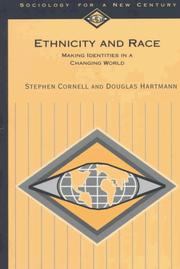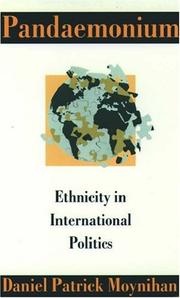| Listing 1 - 5 of 5 |
Sort by
|

ISBN: 0761985018 Year: 1997 Publisher: Thousand Oaks, Calif. ; London ; New Delhi Pine Forge Press
Abstract | Keywords | Export | Availability | Bookmark
 Loading...
Loading...Choose an application
- Reference Manager
- EndNote
- RefWorks (Direct export to RefWorks)
Race. --- Ethnicity. --- Minorities. --- Group identity. --- Race --- Ethnicité --- Minorités --- Identité collective --- Ethnicity --- Group identity --- Minorities --- Ethnic minorities --- Foreign population --- Minority groups --- Persons --- Assimilation (Sociology) --- Discrimination --- Ethnic relations --- Majorities --- Plebiscite --- Race relations --- Segregation --- Collective identity --- Community identity --- Cultural identity --- Social identity --- Identity (Psychology) --- Social psychology --- Collective memory --- Ethnic identity --- Cultural fusion --- Multiculturalism --- Cultural pluralism --- Ethnicité --- Minorités --- Identité collective --- Collectief bewustzijn --- Collectieve identiteit --- Conscience collective --- Différence (sociologie) --- Groepsidentiteit --- Groupe [Identité de ] --- Identiteit [Sociale ] --- Identity [Collective ] --- Identity [Community ] --- Identity [Group ] --- Identity [Social ] --- Identité communautaire --- Identité de groupe --- Identité sociale --- Identités collectives --- Ras --- Physical anthropology

ISBN: 0198277873 9780198277873 Year: 1993 Publisher: Oxford: Oxford university press,
Abstract | Keywords | Export | Availability | Bookmark
 Loading...
Loading...Choose an application
- Reference Manager
- EndNote
- RefWorks (Direct export to RefWorks)
International relations. Foreign policy --- Political philosophy. Social philosophy --- National movements --- Caractères culturels --- Caractères ethniques --- Cohabitation pluri-ethnique --- Conscience nationale --- Consciousness [National ] --- Ethnic identity --- Ethnic relations --- Ethnicity --- Ethnicité --- Ethnisch bewustzijn --- Etnische relaties --- Groepsbewustzijn [Etnisch ] --- Group identity [Ethnic ] --- Groupes ethniques -- Identité --- Groupes ethniques -- Relations --- Identity [National ] --- Identité culturelle --- Identité ethnique --- Identité raciale --- Identités ethniques --- Interethnic relations --- Nationaal bewustzijn --- Nationaal gevoel --- National consciousness --- National identity --- Nationalism --- Nationalisme --- Relaties [Etnische ] --- Relations among ethnic groups --- Relations entre groupes ethniques --- Relations ethniques --- Relations interculturelles --- Relations interethniques --- Sentiment national --- Tribalisme --- World politics --- Politique mondiale --- Ethnicity, --- 1989 --- -World politics --- -327 --- -#SBIB:327.1H20 --- #A9306A --- Colonialism --- Global politics --- International politics --- Political history --- Political science --- World history --- Eastern question --- Geopolitics --- International organization --- International relations --- Consciousness, National --- Identity, National --- Patriotism --- Autonomy and independence movements --- Internationalism --- Political messianism --- Group identity --- Cultural fusion --- Multiculturalism --- Cultural pluralism --- Inter-ethnic relations --- Acculturation --- Assimilation (Sociology) --- Ethnic groups --- Ethnology --- Social problems --- Sociology --- Minorities --- Race relations --- Buitenlandse betrekkingen. Buitenlandse politiek. Internationale betrekkingen. Internationale politiek. Wereldpolitiek --- Sociologie van de internationale betrekkingen: algemeen --- #A9405PO --- 327 --- 327 Buitenlandse betrekkingen. Buitenlandse politiek. Internationale betrekkingen. Internationale politiek. Wereldpolitiek --- -Caractères culturels --- #SBIB:327.1H20 --- -Sociologie van de internationale betrekkingen: algemeen --- -Ethnicity --- World politics - 1989 --- -Ethnicity, --- Nationalism. --- Ethnic relations. --- -#A9405PO --- DOCTRINES POLITIQUES --- DOCTRINES POLITIQUES PARTICULIERES --- NATIONALISME --- VIE POLITIQUE --- MINORITES --- GROUPES ETHNIQUES
Book
ISBN: 902094116X 9789020941166 Year: 2000 Publisher: Tielt Lannoo
Abstract | Keywords | Export | Availability | Bookmark
 Loading...
Loading...Choose an application
- Reference Manager
- EndNote
- RefWorks (Direct export to RefWorks)
Mark Nelissen is professor biologie aan de Antwerpse Universiteit. Tijdens examens ontgaat het hem niet hoe vaak een studente haar lippen beroert en op recepties ziet hij hoe scheef je hoofd staat, of je het woord kan houden en naar welke aanwezige partij je blik afdwaalt. Het zijn allemaal erfenissen uit ons Moederland die het beest in ons bloot geven, zaken die de professor nauw aan het hart liggen. Ons Moederland is de omgeving waaraan we ons in de loop van onze evolutionaire geschiedenis aanpasten. We hebben nog steeds de hersenen van holbewoners, we delen onze seksuele neigingen met andere primaten, en zijn nog steeds even belust op status als miljoenen jaren geleden. Veel van onze bizarre neigingen, gaande van overspel tot oorlog en kindermoord, zijn evolutionair succesvolle strategieën geweest waardoor de daders zich beter konden voortplanten dan anderen. De neiging om te vluchten bij onraad, de aantrekkelijkheid van een slanke taille, de onkuisheid van presidenten, zijn in het licht van de evolutie mooi te verklaren. Zoals het hoort, kadert Nelissen eerst zorgvuldig de principes van natuurlijke selectie. Vervolgens neemt hij diverse aspecten van seksualiteit onder de loep, de voortplantingsstrategieën van mannen en vrouwen, de agressie en dominantiestrijd, onze communicatie en taalgebruik en bewustzijn. Hij traint onze reflex om ons bij elk gedrag de vraag te stellen naar de oorspronkelijke waarde ervan in termen van overleving en reproductie. Een mooie vrouw krijgt door de primitieve kracht van aantrekkelijkheid, lichaamsgrootte en feromonen alles van de mannen gedaan. Andere vrouwen wapenen zich in de subtiele oerstrijd van vrouwelijke seksuele competitie: de tegenstandster wordt afgezwakt door te roddelen. Een jongeman traint zich te pletter om uit te blinken in zijn sport. Als elke andere jonge primaat aast hij op de hoogste sport op de hiërarchische ladder.
Gedrag (mensen). --- Genetica. --- Ontwikkelingspsychologie. --- Seksualiteit. --- Diereneco- en -ethologie. Sociobiologie. --- Hersenen. --- Evolutieleer. --- Menselijke ecologie. Sociale biologie. --- Human ecology. Social biology --- Genetics --- Animal ethology and ecology. Sociobiology --- gedrag (mensen) --- ontwikkelingspsychologie --- seksualiteit --- genetica --- hersenen --- evolutieleer --- 316.6 --- Academic collection --- #SBIB:316.21H42 --- #SBIB:309H505 --- #GSDBP --- 316.244 --- 57.02 --- Evolutie --- Psychologie --- Sociale psychologie --- Sociobiologie --- evolutietheorie (evolutieleer, darwinisme) --- gedrag --- 316.6 Gedragstheorie. Sociaal gedrag. Sociale psychologie --(gedrag en zelfconcept van het individu in de groep z.o. {159.923.33}) --- Gedragstheorie. Sociaal gedrag. Sociale psychologie --(gedrag en zelfconcept van het individu in de groep z.o. {159.923.33}) --- Theoretische sociologie: sociobiologie --- Code en boodschap: psychologische, psycho-analytische benadering --- théorie de l'évolution (darwinisme) --- comportement --- #VCV monografie 2002 --- Biologie --- Erfelijkheid (genetica) --- Gedrag --- C6 --- natuurkunde --- biologie --- Opvoeding, onderwijs, wetenschap --- gedragscode --- 574 --- Agressie --- Bewustzijn --- Communicatie --- Darwin, Charles --- Dominantie --- Genen --- Hersenen --- Mens --- Menswording --- Natuurlijke selectie --- Oorlog --- Seksualiteit --- Selectie --- Taal --- Voortplanting --- Afstammingsleer - Evolutieleer --- 600.1 --- Darwin Charles --- communicatie --- evolutie --- taal --- Evolutie van de mens --- Menselijk gedrag --- Sekseverschillen --- Lichaamstaal --- erfelijkheidsleer --- psychologie --- agressiviteit (agressie) --- communicatie (leesbaarheid) --- bewustzijn --- 415.3 --- (zie ook: pedagogiek, psychiatrie) --- Sekseverschil --- Darwin, Charles, --- Gedragswetenschap
Book
ISBN: 9031334529 9789060609019 903133779X 9031337803 Year: 2002 Publisher: Houten Bohn Stafleu Van Loghum
Abstract | Keywords | Export | Availability | Bookmark
 Loading...
Loading...Choose an application
- Reference Manager
- EndNote
- RefWorks (Direct export to RefWorks)
Groei, rijping en ontwikkeling : ontwikkeling van kinderen - moeders, baby's en vaders - zintuigen - lichaamsbeheersing ; Denkend wezen : hoe leren kinderen - denken - taal ; Bouwstenen van persoonlijkheid : bewustzijn en zelfbeeld - veilige basis - persoonlijkheid in wording ; Problemen van goed en kwaad : gewetensvorming - agressie - kinderangsten ; Creativiteit : fantasie - kinderspel - kindertekeningen ; Mens tussen de mensen : plaats in kinderrij - meisjes en jongens
ontwikkelingspsychologie --- kinderpsychologie --- Developmental psychology --- kinderen --- Ontwikkelingspsychologie ; kleuters --- Ontwikkelingspsychologie ; kinderen --- Groei --- Jongeren --- Kinder- en jeugdpsychiatrie --- Neonatalogie --- Psychologie --- 416.1 --- 416.2 --- 416.23 --- Agressie --- Angsten --- Denken --- Fantasie --- Identiteit (Zelfbeeld Zelfkennis) --- Kinderen --- Kindertekeningen --- Leeftijdsopbouw --- Leren --- Motorische ontwikkeling --- Ontwikkeling --- Ontwikkelingspsychologie(Kinderpsychologie, Jeugdpsychologie) --- Persoonlijkheidsleer --- Sekseverschillen --- Sociale ontwikkeling --- Spelen(Kinderspelen) --- Taalontwikkeling --- Taalverwerving --- Waardevorming --- Zelfvertrouwen --- Zintuiglijke ontwikkeling --- agressiviteit --- angst --- angststoornissen --- babyverzorging --- bewustzijn --- creativiteit --- denken --- gender --- geweten --- gezondheidszorg --- groei --- lichaamsbeleving --- linguïstiek --- moeders --- persoonlijkheidsontwikkeling --- psychologie --- sekseverschillen --- sociale ontwikkeling --- taal --- vaderschap --- verpleegkunde --- vroedkunde --- zelfbeeld --- zintuigen --- 416 --- Angstige kinderen --- Cognitieve ontwikkeling (Denkontwikkeling) --- Creativiteit --- Gewetensvorming --- Kinderpsychologie --- Lichaamsschema --- Ontwikkeling van kinderen --- Ontwikkelingspsychologie --- Persoonlijkheidsontwikkeling --- Piaget, Jean --- Spelen --- Zelfbeeld --- Zintuigen --- 159.922 --- Emoties --- Gedrag --- Persoonlijkheid --- Croissance --- Jeunes --- Pédopsychiatrie --- Néonatalogie --- Algemene kinder- en jeugdpsychologie --- Psychologie van afzonderlijke leeftijdsgroepen der jeugd --- Tot c. 13 jaar --- Ontwikkelingspsychologie of genetische psychologie --- adolescentiepsychologie --- ontwikkelingspsychologie, genetische psychologie --- 040255.jpg
Book
ISBN: 9783319546810 3319546813 3319546805 Year: 2017 Publisher: Basingstoke Springer Nature
Abstract | Keywords | Export | Availability | Bookmark
 Loading...
Loading...Choose an application
- Reference Manager
- EndNote
- RefWorks (Direct export to RefWorks)
This book is open access under a CC BY 4.0 license. This volume discusses the effects, models and implications of history teaching in relation to conflict transformation and reconciliation from a social-psychological perspective. Bringing together a mix of established and young researchers and academics, from the fields of psychology, education, and history, the book provides an in-depth exploration of the role of historical narratives, history teaching, history textbooks and the work of civil society organizations in post-conflict societies undergoing reconciliation processes, and reflects on the state of the art at both the international and regional level. As well as dealing with the question of the ‘perpetrator-victim’ dynamic, the book also focuses on the particular context of transition in and out of cold war in Eastern Europe and the post-conflict settings of Northern Ireland, Israel and Palestine and Cyprus. It is also exploring the pedagogical classroom practices of history teaching and a critical comparison of various possible approaches taken in educational praxis. The book will make compelling reading for students and researchers of education, history, sociology, peace and conflict studies and psychology.
Cognitive psychology --- Social psychology --- History of education and educational sciences --- Educational psychology --- Teacher education. Teacher's profession --- History of Europe --- pedagogische psychologie --- geschiedenis --- onderwijs --- bewustzijn --- Europese geschiedenis --- persoonlijkheidsleer --- lerarenopleiding --- lesgeven --- Europe --- History --- Reconciliation --- Study and teaching --- Social aspects --- Education --- Consciousness. --- Educational psychology. --- History of Education. --- Teaching and Teacher Education. --- Personality and Social Psychology. --- Educational Psychology. --- European History. --- History. --- Psychology --- Apperception --- Mind and body --- Perception --- Philosophy --- Spirit --- Self --- Teaching --- Education—History. --- Teaching. --- Personality. --- Social psychology. --- Education—Psychology. --- Europe—History. --- Personal identity --- Personality psychology --- Personality theory --- Personality traits --- Personology --- Traits, Personality --- Individuality --- Persons --- Temperament --- Mass psychology --- Psychology, Social --- Human ecology --- Social groups --- Sociology --- Didactics --- Instruction --- Pedagogy --- School teaching --- Schoolteaching --- Instructional systems --- Pedagogical content knowledge --- Training --- civil society organisations --- textbook studies --- history textbooks --- textbook writing --- post-conflict societies --- perpetrators --- victims
| Listing 1 - 5 of 5 |
Sort by
|

 Search
Search Feedback
Feedback About UniCat
About UniCat  Help
Help News
News